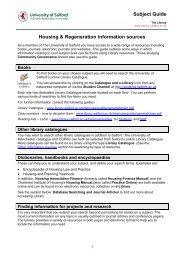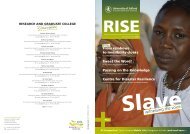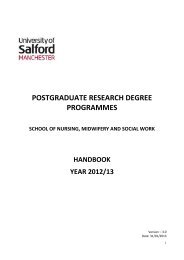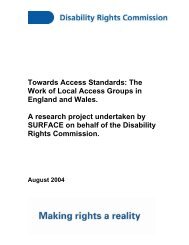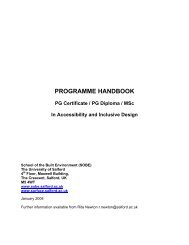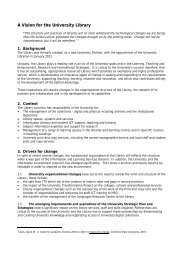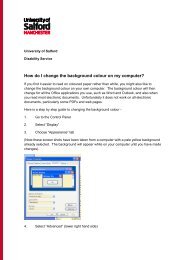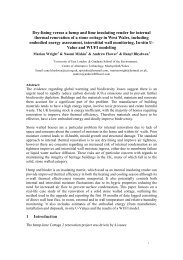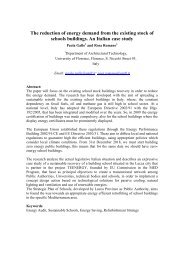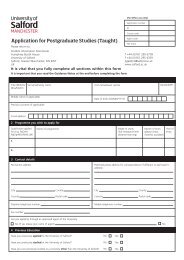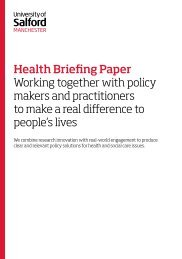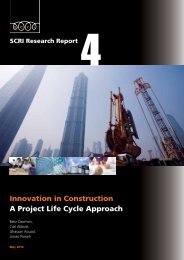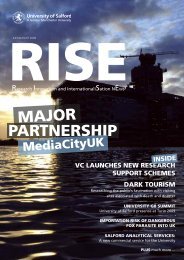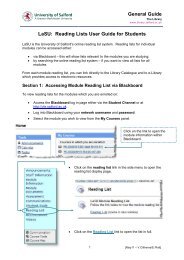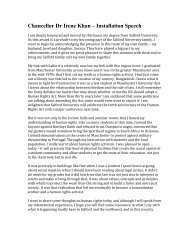RISE May-June 2009 - University of Salford
RISE May-June 2009 - University of Salford
RISE May-June 2009 - University of Salford
Create successful ePaper yourself
Turn your PDF publications into a flip-book with our unique Google optimized e-Paper software.
<strong>RISE</strong>! Research Innovation and Internationalisation News<br />
RESEARCH AND INNOVATION: SHAPING THE FUTURE<br />
REPORT: HEALTH, SOCIAL CARE AND WELLBEING<br />
Pr<strong>of</strong>essor Mike Kagioglou, BuHu / SOBE; Dr Lindsey Dugdill, Faculty <strong>of</strong> Health and Social Care; Mr. Ricardo Codinhoto,<br />
BuHu / SOBE; and Mrs Kathryn Yates, BuHu / SOBE.<br />
This scoping report addressed the internal capacity and expertise<br />
available in this area at the <strong>University</strong> <strong>of</strong> <strong>Salford</strong>, sources <strong>of</strong> UK/European<br />
funding available for health, social care and wellbeing related research, key<br />
policy drivers, and future opportunities. Health, social care and wellbeing<br />
have been increasingly topical in the political agenda in the last 8 years.<br />
During this period, in excess <strong>of</strong> £3.5 billion has been spent improving<br />
schools, hospitals and other public buildings/infrastructure in the North<br />
West. In health and social care, the main drivers are to increase quality<br />
whilst reducing costs, to increase efficiency and effectiveness, improve<br />
patient experience (Darzi, 2008) and fundamentally improve health and<br />
social care / wellbeing outcomes. Thus, in general, health and social care is<br />
moving gradually from “curative” to a more “preventative” approach<br />
towards sustainable wellbeing.<br />
Within the <strong>Salford</strong> <strong>University</strong> context, some multi-disciplinary/cross<br />
faculty/health and social care related research has been conducted but<br />
opportunities have not yet realised the potential with respect to the<br />
agenda <strong>of</strong> opportunity in the field. In particular, there is strong need for<br />
inter and multidisciplinary research across disciplines that cut across the<br />
whole <strong>University</strong>. There are many funding bodies and opportunities<br />
for health, social care and wellbeing research.<br />
Strategic Recommendations:<br />
1. Establish an advisory/steering leadership group that would take<br />
forward the recommendations and explore future opportunities over<br />
a period <strong>of</strong> 6 to 12 months.<br />
2. Prioritise funding/training opportunities as part <strong>of</strong> a coherent<br />
strategy in the areas <strong>of</strong> Health, Social Care and Wellbeing.<br />
3. Aim to emulate the healthy wellbeing ethos through to all areas <strong>of</strong><br />
the <strong>University</strong>, for example when planning new buildings, catering,<br />
etc. so that we move to a situation where the <strong>University</strong> <strong>of</strong> <strong>Salford</strong><br />
not only delivers but also embodies this ethos.<br />
4. Engage with and enhance our collaboration with key institutions in<br />
the UK and internationally that have an established influence both in<br />
funding and policy terms, for example <strong>University</strong> Medical School Kings<br />
College London, Imperial College, among others.<br />
Future Opportunities:<br />
1. Develop a Centre for multidisciplinary research across knowledge<br />
bases, schools and expertises: the study identified many centres<br />
working in the same areas across different contexts.<br />
The report identified the main (high) level research themes to be (in no<br />
particular order): a) Environment; b) Public/Social Health/Care; c)<br />
Education/Training; d) Evidence-Based Approaches; and e) Information and<br />
Communication Technology (ICT). A sixth theme “Patient/ Communities<br />
Experience” is also included and it was considered as a broader crosscutting<br />
theme encompassing the other five themes.<br />
2. Identify and bid for external infrastructure monies in the future that<br />
will allow the development <strong>of</strong> mock-up rooms (both physical and<br />
virtual), link medical and non-medical practices to enable better<br />
training and education.<br />
3. Internationalise our funding sources: the majority <strong>of</strong> the existing<br />
funding in the areas <strong>of</strong> the study are UK-based and there is a need<br />
to engage with international agendas and funding sources.<br />
4. Work more closely with key user-communities and stakeholders<br />
through Knowledge Transfer Partnerships (KTPs) and collaborative<br />
work to increase our impact and pr<strong>of</strong>ile and help alleviate<br />
degreasing research council funding. For example the Media<br />
City project <strong>of</strong>fers great opportunities in this area.<br />
5. New multi-faceted courses need to be developed in particular<br />
around Continuous Pr<strong>of</strong>essional Development (CPD) and<br />
organisation specific training (work-based learning). There are<br />
also opportunities in the area <strong>of</strong> pr<strong>of</strong>essional doctorates.<br />
6. ICT healthcare/workplace health school/centre needed: there is a<br />
missed opportunity in capitalising our ICT competencies across the<br />
<strong>University</strong> and great advances can be made here at a fast speed.<br />
27



